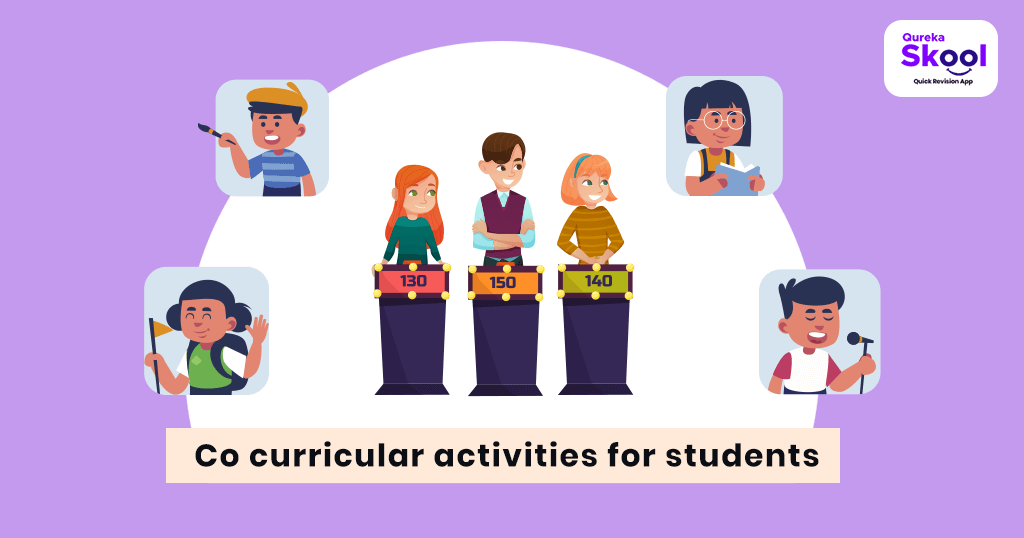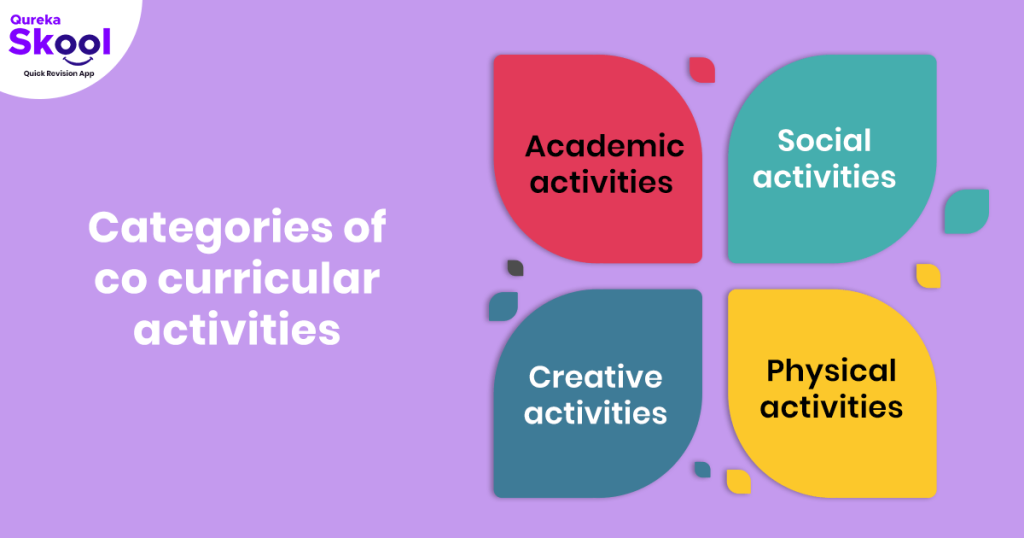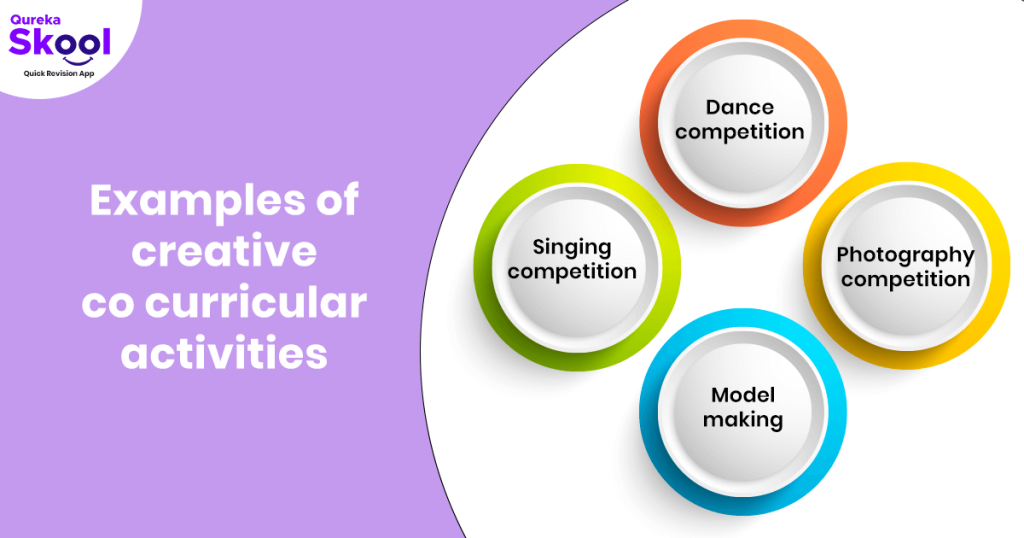
Co curricular activities are an inseparable part of the school. Different children have different talents. Some might excel in studies while others may find talents in singing, dancing, craft, or sports. Such activities are known to stimulate creative thinking.
A child who has a higher level of creative thinking tends to become a problem solver in the future. Such skills are very important and are developed at the initial stages of life. Such activities also allow children to explore their interests and talents outside the classroom. There is a wide range of co curricular activities available for children of all ages, so it is important to find the right one.
Let’s take a look at the types of co curricular activities before you dig deeper to learn about the importance of such activities for children.
Table of Contents
What are the types of co curricular activities?

Firstly, one needs to understand the basic difference between co curricular and extracurricular activities. CCA is attached to the academic subjects while ECA is optional. Both types of activities support the overall development of the child. There is a wide range of co curricular activities available for students at school. One must understand the categories under which the activities are nicely divided. Check out the examples of all such types below.
Academic activities
- Extempore competition
- Story writing competition
- Poetry recitation competition
- Essay writing competition
- Spell bee competition
- GK quiz competition
Attempt GK quizzes on Qureka Skool app now!
Social activities
- Student council participation
- School newspaper participation
- Awareness campaign participation
- Cleanliness drive participation
Physical activities
- N.C.C
- Scouts and guides
- Yoga
- Annual sports day participation
- Half marathon participation for a charity cause
Creative activities

- Dance competition
- Singing competition
- Theatre act participation
- Stamp collection
- Model making
- Fancy dress competition
- Cooking competition
- Photography competition
Importance of co curricular activities at school
Co curricular activities help children be well-rounded and successful in all aspects of their lives. This means ensuring that they not only excel academically but also are involved in extracurricular activities. These activities help to develop essential life skills such as teamwork, communication, and leadership.
The book, “Disciplined Mind” by Howard Gardner talks about a world citizenry that is highly literate, disciplined, and capable of thinking critically and creatively about a range of topics.
Such type of thinking is possible and easier when a child experiences co curricular activities along with the academic curriculum.
Each of the above-mentioned types of activities has its own benefits. For example, taking part in a dance competition not just improves the moves but also enhances confidence in a child. Some positive changes take place in a child when he/she performs in front of a huge crowd.
The same goes for taking part in an extempore competition. A child becomes less hesitant while regularly participating in extempore competitions. Such activities push the child to grab knowledge on various topics which eventually leads to academic development too.
A cleanliness drive is not only beneficial for society but for the child as well. A student studying in a school learns to live in a clean environment through this activity. Such students start to appreciate the cleanliness around them and try to preserve the environment.

Extracurricular activities facilitate the development of the following:
- Leadership skills
- Critical thinking
- Creative thinking
- Problem-solving skills
- Communication skills
- Social values
- Emotional skills
Senior students are most of the time self-motivated to join co curricular activities at school but children in the lower age group need motivation from their teacher. Positive support from the teacher can boost their confidence at the beginning to participate in competitions. Read further to discover the tips to motivate students of lower age groups to participate in extracurricular activities.
Also, read 5 powerful ways for students to build self-confidence
Tips to encourage children to take part in co curricular activities
Although co curricular activities are necessary but not every student is interested. There might be various reasons for their disinterest but so are the ways to encourage them to take part in such activities. Scroll down to look for practical tips.
- Understanding their interest
Some students might be interested in dancing while some might have their eyes on singing. Trial and test is a very common method for students to know what they really like.
- The reward system

Offering monetary and non-monetary rewards can prove to be a real way to motivate students to take part in extracurricular activities. It is a well-known fact that children love gifts and rewards. The school authorities and teachers need to make sure that the rewards given to the children are useful for them. Some examples of rewards system are:
– Sit in a special chair
– Be the class monitor
– Stationery kit
– Earn a badge
– Certification of participation
– Good remarks in the diary
– Recognition in class
– Cash prize with gifts
Read more about classroom rewards for elementary students here!
- Ask for parents’ involvement
A child looks up to his/her parent. The involvement of parents in co curricular activities is very important for a child. A teacher should always keep the parents in the loop about the ongoing extracurricular activities. Children tend to copy their parents a lot especially when they are acing at any extracurricular activities.
Co curricular activities are not just a way to have fun and relieve stress but also help in the holistic development of the student. We hope that the fact that co curricular activities improve both academic and non-academic performance is well established now.
Some FAQs about co curricular activities
Q.1 Are co curricular activities good for relieving stress in students?
Yes, co curricular activities tend to support students through social interaction and recognition. Thus, leading to reduced stress and anxiety.
Q,2 Which extracurricular activities help in reducing stage fear among students?
Activities such as participating in debate clubs or dance competitions are good for reducing stage fear.
Q.3 Do all children have similar interests when it comes to participation in co curricular activities?
No, different children have different interests. Some might be interested in Maths quizzes while others might be interested in a painting competition.
If you have any views on co curricular activities then do comment below. Follow us on our Insta and Facebook channels.
